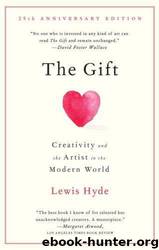The Gift-Creativity and the Artist by Lewis Hyde

Author:Lewis Hyde
Language: eng
Format: mobi
Tags: Non-Fiction, Philosophy, Art
ISBN: 9780307279507
Publisher: Vintage
Published: 1979-01-01T00:00:00+00:00
To whom does the artist address the work? Long ago we said that a gift eventually circles back toward its source. Marcel Mauss put the same idea in slightly different terms: every gift, he wrote, “strives to bring to its original clan and homeland some equivalent to take its place.” And though it might be hard to say with any certainty where we will find the homeland of an inner gift, artists in every age have offered us myths to suggest where we should look. Some take their gifts to be bestowals of the gods or, more often perhaps, of a personal deity, a guardian angel, genius, or muse—a spirit who gives the artist the initial substance of his art and to whom, in return, he dedicates the fruit of his labor. Such, as we shall see, was Whitman’s myth. The initial stirrings of his work he took to be bestowals of his soul (or of a young boy, sometimes—or both), and his responsive act was to “make the work” (this being the motto that sat on Whitman’s desk) and speak it back to the soul, the boy.
Ezra Pound’s creative life was animated by a myth in which “tradition” appears as both the source and ultimate repository of his gifts. Pound’s first master, Yeats, articulated the sensibility: “I … made a new religion, almost an infallible church of poetic tradition, of a fardel of stories, and of personages, and of emotions, inseparable from their first expression, passed on from generation to generation by poets and painters … I wished for a world where I could discover this tradition perpetually, and not in pictures and in poems only, but in tiles round the chimney-piece and in the hangings that kept out the draft.” For Pound, I think, what gifts we have come ultimately from the gods, but a “live tradition” is the storehouse in which the wealth of that endowment is preserved. Pound speaks certain names over and over again—Homer, Confucius, Dante, Cavalcanti—the lineage of gifted souls whose works had informed his own. To the end of his days he dedicated a portion of his labor to the renewal of their spirits.
To offer but one more of these myths of closing the circle, of artists directing their work back toward its sources, the Chilean poet Pablo Neruda took the beginnings of his art to lie not with spirits or with the past, but with something human, current, and almost anonymous. His gifts sprang, he felt, from brotherhood, from “the people,” and he quite consciously offered his art in recognition of the debt: “I have attempted to give something resiny, earthlike, and fragrant in exchange for human brotherhood.” He counted as “the laurel crown for my poetry” not his Nobel Prize but a time when “from the depths of the Lota coal mine, a man came up out of the tunnel into the full sunlight on the fiery nitrate field, as if rising out of hell, his face disfigured by his terrible
Download
This site does not store any files on its server. We only index and link to content provided by other sites. Please contact the content providers to delete copyright contents if any and email us, we'll remove relevant links or contents immediately.
| African | Asian |
| Australian & Oceanian | Canadian |
| Caribbean & Latin American | European |
| Jewish | Middle Eastern |
| Russian | United States |
4 3 2 1: A Novel by Paul Auster(11064)
The handmaid's tale by Margaret Atwood(6866)
Giovanni's Room by James Baldwin(5889)
Big Magic: Creative Living Beyond Fear by Elizabeth Gilbert(4730)
Asking the Right Questions: A Guide to Critical Thinking by M. Neil Browne & Stuart M. Keeley(4591)
On Writing A Memoir of the Craft by Stephen King(4220)
Ego Is the Enemy by Ryan Holiday(3999)
Ken Follett - World without end by Ken Follett(3980)
The Body: A Guide for Occupants by Bill Bryson(3813)
Bluets by Maggie Nelson(3721)
Adulting by Kelly Williams Brown(3678)
Guilty Pleasures by Laurell K Hamilton(3590)
Eat That Frog! by Brian Tracy(3521)
White Noise - A Novel by Don DeLillo(3439)
The Poetry of Pablo Neruda by Pablo Neruda(3370)
Alive: The Story of the Andes Survivors by Piers Paul Read(3317)
The Bookshop by Penelope Fitzgerald(3234)
The Book of Joy by Dalai Lama(3224)
Fingerprints of the Gods by Graham Hancock(3218)
